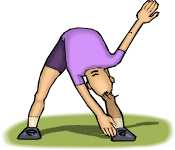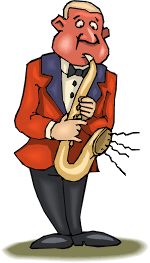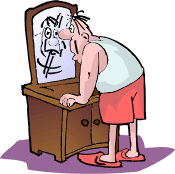
Developing a Great Sound
This Online Lesson is (c)
2001
Ryan Fraser. All right reserved. NO COMMERCIAL DISTRIBUTION.
THIS LESSON HAS BEEN DOWNLOADED AND PRINTED FROM WWW.RYANFRASER.COM. YOU MAY USE THIS DOCUMENT FOR YOUR OWN USE, PROVIDED THAT YOU ACKNOWLEDGE THE SOURCE. PLEASE DO NOT PHOTOCOPY. THE CONTENTS OF THIS DOCUMENT MAY CHANGE FROM TIME TO TIME.
For the beginner, the most flustrating part of learning any instrument is figuring out how to
get a good sound. You start to learn an instrument, and the first thing that you do is make a
wretched sound. The second thing you do is make a worse sound...well, you get the idea. If you
are reading through this lesson, you know exactly what I'm talking about!
The most important thing to remember at this point is Fraser's Silly Rule #3 : You have to
be really, really bad at something before you can become really, really good. Remember this!
Make it your mantra while you work on tone.
Here are a few things that you can do to help you along the way:
Practice on a Regular Basis
Many people who are frustrated with their tone, sometimes forget that learning to play the
saxophone is as much a physical activity as a mental activity. Imagine how well a professional
athlete would perform if they weren't constantly training. Training provides a regular routine
which helps to strengthen, shape and develop muscles. For aspiring musicians, regular practice
does the same to the muscles that support your embouchure, and help
you control your breathing. Good tone is impossible without maintaining your muscles, and
nothing is better than regular practice to help you develop those crucial muscles.
Find a tone that you admire.
Next to practice, your ears will be your most valuable tool in finding a good tone. Listen to as
many saxophonists as you possibly can -- after all, if you don't know what you want to sound
like, you will never be happy with your sound. Also, be sure to listen for sounds that you
absolutely do not ever want to hear again - I always tell my students that you have to be able to
do what you don't want to do on purpose, so that you don't ever do it by accident. (Follow me
there? Basically, if you can screw up on purpose, you will be much less likely to do it by
accident!)
Remember that when you are starting out, you may not know exactly what (or who!) you
want to sound like. By listening to many, many, many other players, you no longer have to
flounder and hope you stumble across a "nice" sound - instead you can aim for a specific goal.
In all things related to practice, being goal-centred will help you arrive much, much faster to your
intended destination!
OK, Enough Philosophy, Fraser!
Alright, alright! For the impatient, here are a few more "specific" things which you can try
(on a regular basis, aiming for that ideal tone):
Do your exercises!
 |
There are a number of exercises that you can do to help improve your tone:
- Long tones. As a beginner, one of the most problematic aspects of tone production is
embouchure instability. Practising long tones is a terrific way to help; build up the muscles that
control your tone. Make the muscles bigger and stronger, and the tone will become more
stable.
There are several specific long tone exercises which you might find helpful to make part of your
practice routine:
- Use the mouthpiece and neckpipe alone. Blow long tones with the minimum amount of
equipment. If you listen carefully, you can hear if your tone wavers or changes at all. By
experimenting with your embouchure you can learn to get a solid basic sound. The beauty of
doing it this way is that you have eliminated 90% of the things that can go wrong - no keys to
worry about, no risk of changing your embouchure to match what register you are playing in,
etc.
- Use a reference pitch. Find a note somewhere in the middle register which gives you a
relatively good sound. (I recommend starting with a third-space E.) Now, move up one
semitone (To an F), and try and match the sound quality. Then, move back to the starting note
(E). Now go down one semitone (Eb), and do the same. Return to the starting note (E), then go
up a tone (F#). Go back to the starting note (E). Go down a tone (D). Keep doing this until you
have reached the point where you are covering the full range of the horn. This is a great
exercises to help maintain your tone across all registers of the instrument.

- Practice Overtones. Remember the first time that you ever tried to play a low Bb on your
saxophone? Probably you got just about every note except for the Bb. Each fingering on the
saxophone actually has a whole series of pitches which ca be produced, even though normally
you only ever play one. As strange as it may seem, these overtones are crucial to tone
production. (For a detailed explanation as to why, read the advanced article
on overtones) For now, try to play as many notes as possible on the low Bb. The more
notes that you can train yourself to play, the better control over your tone you will develop.
- Practice with a mirror. Sounds silly, I know, but for most people, no matter how advanced
they are, most problems with tone are caused by changes in their embouchure and face while
they play. If you watch yourself in the mirror you can see and solve all kinds of problems. Here
are a few things to look for:
- Does your embouchure look comfortable? Remember the Four Steps to Good
Embouchure?
- Do your face and neck look tense? Many people bite like mad, or have a lot of
facial or neck tension in general, and get a harsh tone from all that STRESS. Try to look relaxed,
even if you don't particularly feel that way. (If you are wound up, just imagine running over your
sax with a bulldozer. That will teach it a thing or two!)
- Any visible changes in your facial features when you change notes? You shouldn't
have to change anything to change notes other than your fingers...
- How is your posture? Slouching or bending your neck at awkward angles will
interrupt your airflow, making a good tone difficult to produce.
All of these will help you out - its sort of a type of "biofeedback" training where you can
see how well you are adapting as you go along.
Well, that's it on tone for now. Many, many, many factors go into tone production, so you
might want to brush up on a few other lessons that relate directly to tone:
Breathing,
Embouchure ,
Equipment ,
Posture ,
Silly Rule #1 (Don't be a weenie!).





